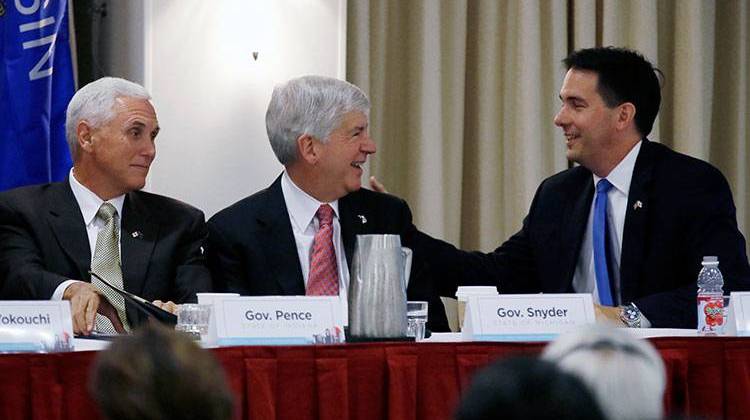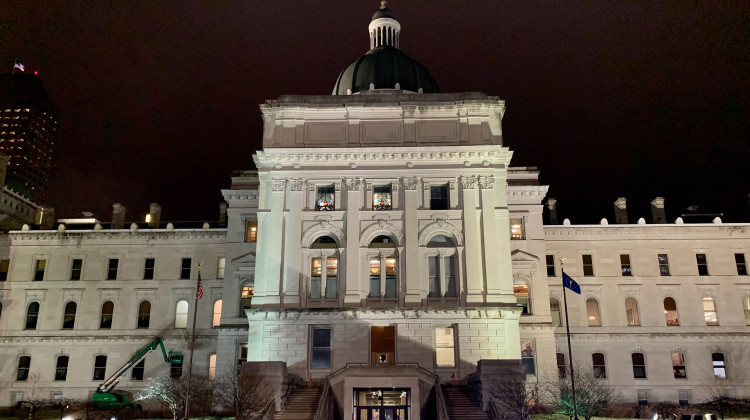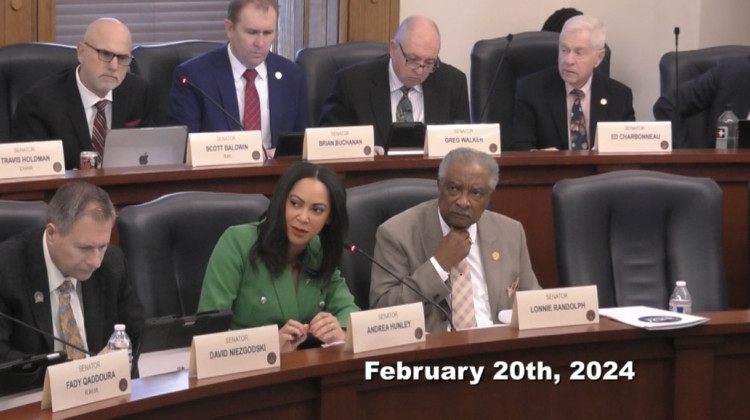
Wisconsin Gov. Scott Walker, right, talks with Indiana Gov. Mike Pence, left, and Michigan Gov. Rick Snyder, center, during the annual meeting of the Midwest U.S-Japan Association, Monday, Sept. 8, 2014, in Des Moines, Iowa.
AP Photo/Charlie NeibergallINDIANAPOLIS – Gov. Mike Pence worked to sell Japanese leaders Monday on new investment in Indiana, saying the “ties that bind our people are strong” and reinforced by shared values of integrity, hard work, tradition and modesty.
But Pence – speaking to the 46th Annual Midwest U.S.-Japan Association Conference – ventured beyond Indiana into world affairs and national security.
The Republican, who has not dismissed a bid for president in 2016, called on Japan, the United States and other nations to pass a 12-country free trade agreement that’s been in negotiation for roughly five years.
“The time has come for all of us, on both sides of the Pacific, to urge the swift adoption of the Trans-Pacific Partnership for the sake of our economies and the sake of our security,” Pence said in prepared remarks. “Stronger economies in America and Japan will mean a safer and more stable region in the world.”
The Trans-Pacific Partnership – which could govern 40 percent of the United States’ imports and exports – would eliminate tariffs on goods and services and, if U.S. negotiators get their way, block other countries from ignoring pharmaceutical patents, limiting where data servers can be located and more.
But Japan and the U.S. remain at odds over the Asian nation’s agriculture tariffs, frustrating other countries involved in the talks and causing progress to grind to a halt on a host of other contentious issues, including intellectual property rights, environmental rules and how government-run businesses should be treated in the deal.
Pence said finalizing the agreement would help to strengthen economic and strategic ties. “I believe that trade means jobs, but trade also means security,” he said.
And he said that a stronger military with “broader capabilities” in Japan coupled with a stronger U.S. military “will mean a stronger and safer free world.”
“As President Reagan proved, peace comes through strength. Conversely, weakness arouses evil,” Pence said. “Japan is without a doubt America’s most important ally in the Pacific.”
The annual Midwest-Japan conference took place this year in Iowa. With 30 officials, Indiana had the largest out-of-state delegation at the conference.
Pence told business leaders there that Indiana is cutting its corporate income tax, boosting vocational education programs in schools, and making new investments in infrastructure.
And he said the state aims to continue its strong relationship with Japanese business. Already, more than 46,000 Hoosiers work in Japanese companies, which operate more than 240 facilities in the state.
“I believe that, in traveling through Japan and seeing the growth in our relationship with your nation over the years, that our economic and strategic ties cannot fully explain the connection that we have made in our state and across the Midwest with your great nation,” Pence said. “I believe that the Japanese people and Japanese companies have found a particularly welcome home in the heartland of America because of shared values.”
Lesley Weidenbener is executive editor of TheStatehouseFile.com, a news website powered by Franklin College journalism students.
 DONATE
DONATE






 View More Programs
View More Programs



 Support WFYI. We can't do it without you.
Support WFYI. We can't do it without you.